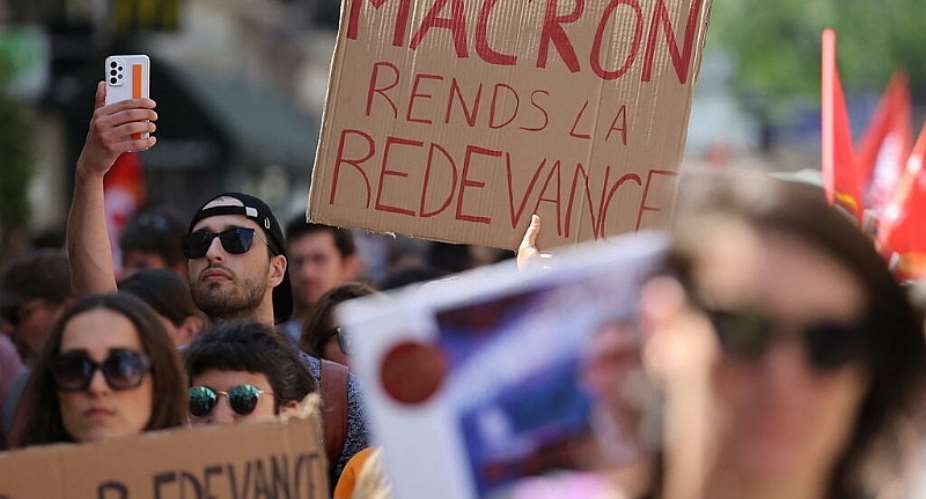Citing fears for its independence, France's public broadcasting sector went on strike Tuesday to denounce President Emmanuel Macron's plan to abolish the yearly audiovisual licence fee paid by millions of households with television sets.
While the government wants to scrap the 138 euro levy as part of its plans to boost purchasing power – a central theme during recent elections – public news organisations worry the move will threaten their very existence.
Unions at RFI and France's 24's parent company, France Media Monde (FMM), staged a day of action, as did those at the France Télévisions group, the European culture channel Arte, Radio France, TV5Monde and the National Audiovisual Institute, INA.
Protesters were called to march in Paris from Montparnasse station to the National Assembly.
Filmmakers, writers and producers joined journalists in denouncing a measure they argue endangers the independence of public broadcasting as well as the “financing of creation”.
In a joint statement, media groups who benefit from the 3.2 billion euros in fees collected each year said the loss of that money would put public broadcasters at the mercy of the general state budget.
“Consequently, this would make it [the audiovisual sector] dependent on random arbitration and incessant political pressure,” the statement said.
“The independence of our media depends on a sustainable method of financing.”
The unions say documentaries, debates, cultural programs, fiction, animation and cinema and news information – whether on radio, television or their digital content platforms – would suffer without direct and guaranteed funding.
However Finance Minister Bruno Le Maire and Public Accounts Minister Gabriel Attal have argued the government could “continue to ensure the media's pluralism and independence” with funding through general taxation.
New legislation
The government wants the scrapping of the audiovisual licence fee to be voted on as part of its new law on purchasing power, which is to be presented to the Council of Ministers on 6 July.
Even if the vote fails, the government would need to find a new means of collecting the fee because the “taxe d'habitation” housing tax to which it is linked is already set to be scrapped.
Despite promises by Macron to preserve the public service to which he is "very attached” (there would be no abolishing channels or slashing costs, he said), news organisations fear they will be forced into mergers to make up for budgetary shortfalls.
An analysis piece by the daily Le Monde said the government was already looking to include funding for public broadcasting in a “multi-year programming law” similar to those used to fund scientific research and the army.
To be voted on in the autumn, the legislation would act as a guarantee for public broadcasters worried their funding would be cut off or fearing repercussions over government dissatisfaction with their editorial line.
Independent body
There is also talk of the creation of a German-style independent commission tasked with assessing and reviewing the public broadcasting budget.
It has been suggested that Arcom, France's digital and audiovisual media regulator, could take on this role, therefore making arbitrary cuts more difficult.
For now French unions remain adamant the licencing fee be maintained – pointing out it is much lower than similar fees in the United Kingdom (173 euros), Austria (300 euros) or Denmark (180 euros).
Germany has chosen to protect the public service from politics altogether, with each household paying 210 euros per year – whether or not they own a TV.
Calculations by the unions estimate France's licence costs a person 38 cents a day, while its abolition would leave a funding gap of more than 3 billion euros a year.





 Akufo-Addo commissions Phase II of Kaleo solar power plant
Akufo-Addo commissions Phase II of Kaleo solar power plant
 NDC panics over Bawumia’s visit to Pope Francis
NDC panics over Bawumia’s visit to Pope Francis
 EC blasts Mahama over “false” claims on recruitment of Returning Officers
EC blasts Mahama over “false” claims on recruitment of Returning Officers
 Lands Minister gives ultimatum to Future Global Resources to revamp Prestea/Bogo...
Lands Minister gives ultimatum to Future Global Resources to revamp Prestea/Bogo...
 Wa Naa appeals to Akufo-Addo to audit state lands in Wa
Wa Naa appeals to Akufo-Addo to audit state lands in Wa
 Prof Opoku-Agyemang misunderstood Bawumia’s ‘driver mate’ analogy – Miracles Abo...
Prof Opoku-Agyemang misunderstood Bawumia’s ‘driver mate’ analogy – Miracles Abo...
 EU confident Ghana will not sign Anti-LGBTQI Bill
EU confident Ghana will not sign Anti-LGBTQI Bill
 Suspend implementation of Planting for Food and Jobs for 2024 - Stakeholders
Suspend implementation of Planting for Food and Jobs for 2024 - Stakeholders
 Tema West Municipal Assembly gets Ghana's First Female Aircraft Marshaller as ne...
Tema West Municipal Assembly gets Ghana's First Female Aircraft Marshaller as ne...
 Dumsor is affecting us double, release timetable – Disability Federation to ECG
Dumsor is affecting us double, release timetable – Disability Federation to ECG
